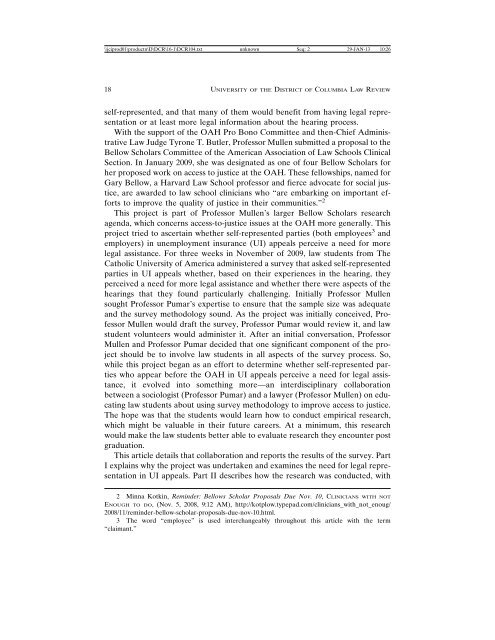volume 16, number 1 - UDC Law Review
volume 16, number 1 - UDC Law Review
volume 16, number 1 - UDC Law Review
- No tags were found...
You also want an ePaper? Increase the reach of your titles
YUMPU automatically turns print PDFs into web optimized ePapers that Google loves.
\\jciprod01\productn\D\DCR\<strong>16</strong>-1\DCR104.txt unknown Seq: 2 29-JAN-13 10:2618 UNIVERSITY OF THE DISTRICT OF COLUMBIA LAW REVIEWself-represented, and that many of them would benefit from having legal representationor at least more legal information about the hearing process.With the support of the OAH Pro Bono Committee and then-Chief Administrative<strong>Law</strong> Judge Tyrone T. Butler, Professor Mullen submitted a proposal to theBellow Scholars Committee of the American Association of <strong>Law</strong> Schools ClinicalSection. In January 2009, she was designated as one of four Bellow Scholars forher proposed work on access to justice at the OAH. These fellowships, named forGary Bellow, a Harvard <strong>Law</strong> School professor and fierce advocate for social justice,are awarded to law school clinicians who “are embarking on important effortsto improve the quality of justice in their communities.” 2This project is part of Professor Mullen’s larger Bellow Scholars researchagenda, which concerns access-to-justice issues at the OAH more generally. Thisproject tried to ascertain whether self-represented parties (both employees 3 andemployers) in unemployment insurance (UI) appeals perceive a need for morelegal assistance. For three weeks in November of 2009, law students from TheCatholic University of America administered a survey that asked self-representedparties in UI appeals whether, based on their experiences in the hearing, theyperceived a need for more legal assistance and whether there were aspects of thehearings that they found particularly challenging. Initially Professor Mullensought Professor Pumar’s expertise to ensure that the sample size was adequateand the survey methodology sound. As the project was initially conceived, ProfessorMullen would draft the survey, Professor Pumar would review it, and lawstudent volunteers would administer it. After an initial conversation, ProfessorMullen and Professor Pumar decided that one significant component of the projectshould be to involve law students in all aspects of the survey process. So,while this project began as an effort to determine whether self-represented partieswho appear before the OAH in UI appeals perceive a need for legal assistance,it evolved into something more—an interdisciplinary collaborationbetween a sociologist (Professor Pumar) and a lawyer (Professor Mullen) on educatinglaw students about using survey methodology to improve access to justice.The hope was that the students would learn how to conduct empirical research,which might be valuable in their future careers. At a minimum, this researchwould make the law students better able to evaluate research they encounter postgraduation.This article details that collaboration and reports the results of the survey. PartI explains why the project was undertaken and examines the need for legal representationin UI appeals. Part II describes how the research was conducted, with2 Minna Kotkin, Reminder: Bellows Scholar Proposals Due Nov. 10, CLINICIANS WITH NOTENOUGH TO DO, (Nov. 5, 2008, 9:12 AM), http://kotplow.typepad.com/clinicians_with_not_enoug/2008/11/reminder-bellow-scholar-proposals-due-nov-10.html.3 The word “employee” is used interchangeably throughout this article with the term“claimant.”














